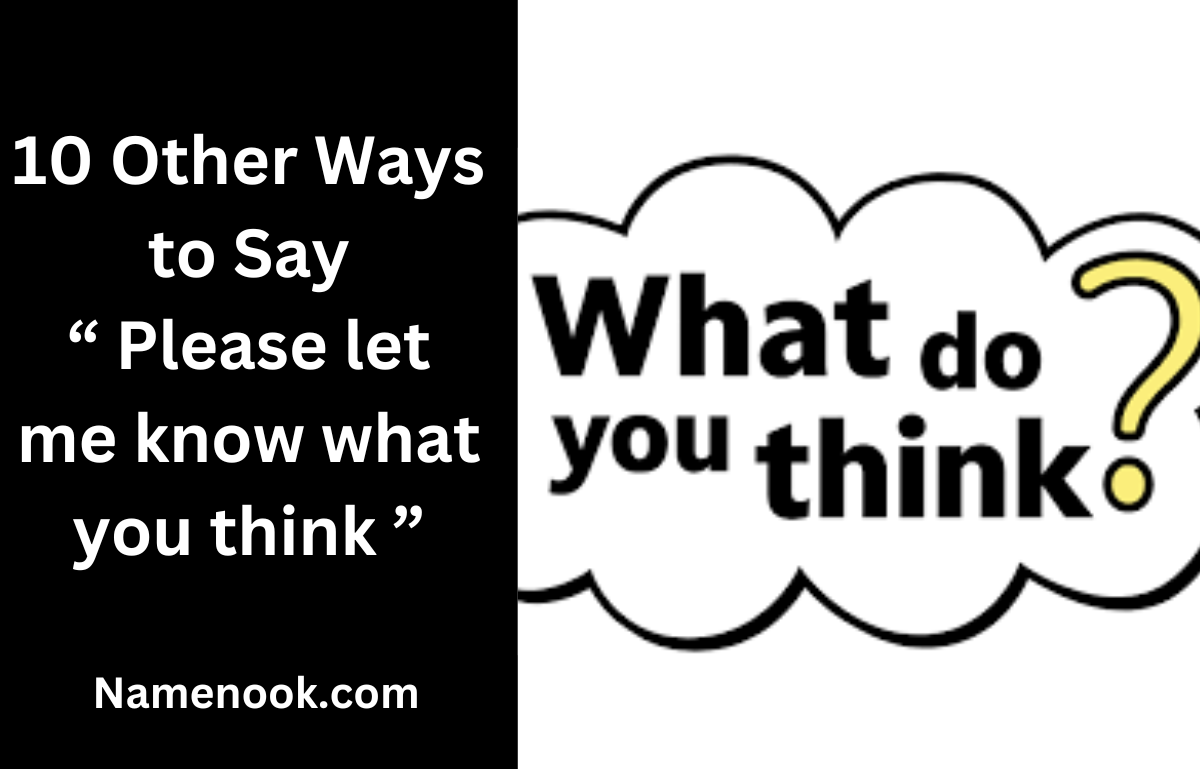Getting feedback is a key part of good communication, teamwork, and personal growth. But if you keep saying, “Please let me know what you think,” over and over, it can start to sound repetitive and less sincere. Mixing up the way you ask for input makes your requests feel more natural and thoughtful.
In this post, I’ll share different ways to politely ask for someone’s thoughts, opinions, or critiques. Whether you’re reaching out to your manager, colleagues, clients, or a broader audience, having a variety of phrases ready can make your request feel more engaging and genuine.
A well-worded request shows that you genuinely value someone’s opinion, making them more willing to share their thoughts.
Some of the suggestions I’ll share are simple and direct, while others are a bit more nuanced. But they all send the same message—you’re open to feedback and eager to learn from others’ expertise. The way we ask for input sets the tone for a productive and positive discussion.
If you’re looking for honest, constructive critiques to help you improve but don’t want to sound repetitive, keep reading. I’ll share 10 thoughtful alternatives to the overused “Let me know what you think,” along with practical examples.
Next time you ask for someone’s perspective, try leading with one of these fresh yet equally sincere approaches.

Is It Nice to Say “Please Let Me Know What You Think”?
Saying “Please let me know what you think” is both polite and professional. It’s a simple way to show that you value someone’s thoughts and insights. While it’s a common phrase, it clearly expresses your interest in their feedback.
While thoughtful wording can show care, simple language often feels more sincere. If you overdo it with fancy phrases, it might come across as insincere. What truly matters is the intention behind the request—wanting feedback to improve.
At the end of the day, as long as your request is genuine, the exact words don’t matter too much. A direct phrase like “Please let me know what you think” makes it clear that you value the other person’s perspective. Adding variations can show extra effort, but the heart of the request remains the same.
Ultimately, asking for feedback is a respectful way to acknowledge someone’s insight and experience. It strengthens relationships by showing you value their opinion.
Here’s an example of how you might use “Please let me know what you think”:
Pros:
- It’s polite and professional. Using “please” makes it clear that you’re making a request, not a demand.
Cons:
- It can feel a bit impersonal or distant—there are warmer, more personal ways to ask for someone’s input.
- If used too often, it may start to sound repetitive. Mixing up your wording can make your request feel more thoughtful.
What to Say Instead of “Please Let Me Know What You Think”
Alternative Ways to Ask for Feedback
- I’d love to hear your thoughts on this.
- Let me know if you have any feedback.
- I’d really appreciate your perspective.
- Please share any insights you have.
- I’m curious to hear your take on this.
- Feel free to share any comments.
- Your input would mean a lot.
- I’m open to any suggestions you may have.
- Any feedback is greatly appreciated.
- Looking forward to hearing your thoughts!
1. I would appreciate your thoughts on this.
This phrase is a polite and professional way to ask for someone’s feedback or opinion. It shows that you genuinely value their perspective and are interested in what they have to say.
It’s commonly used in work settings—like emails, meetings, or discussions about projects and ideas—but it can also fit in more personal situations.
For example, after presenting a new project proposal at work, you might say, “I’d really appreciate your thoughts on this; your expertise in this area is invaluable.”
Or if you’re sharing a piece of art you’ve created, you could say, “I’ve put a lot of effort into this piece, and I’d love to hear your thoughts.”
2. Let me know if you have any feedback.
This phrase is flexible and works well in both formal and casual situations. It encourages others to share their thoughts or critiques in a way that feels open and welcoming. It also signals that you’re open to all kinds of feedback, whether positive or constructive.
For example, after giving a presentation, you might say, “Let me know if you have any feedback—I’m always looking to improve.”
Or, if you’ve cooked a new recipe for friends, you could say, “I tried something new tonight, so let me know what you think!”
3. I welcome your perspective.
This phrase shows genuine respect for someone’s opinion and suggests that their insights could offer a fresh or valuable perspective. It’s especially helpful when discussing complex topics where different viewpoints can make a real difference.
In a team meeting, you might say, “This is a tough challenge, and I’d love to hear your thoughts on how we can approach it.”
Or in a personal conversation about life decisions, you could say, “I’m at a crossroads in my career, and I’d really appreciate your perspective.”
4. Please share your insights with me.
This phrase directly acknowledges the other person’s expertise and invites them to share their unique knowledge or perspective. It’s especially useful when you know they have valuable experience or insight on the topic.
In a mentorship session, you might say, “I’m having trouble understanding this concept—I’d really appreciate your insights.”
Or, when working on a team project, you could say, “You have a lot of experience in this area—I’d love to hear your thoughts.”
5. I’m interested in your take on this.
This casual phrase is perfect for inviting a relaxed exchange of opinions. It shows you’re genuinely curious about the other person’s personal view or interpretation, making it ideal for conversations with colleagues or friends.
In a work discussion, you might say, “We’ve had a few different ideas about this project, and I’d love to hear your take on it.”
Or, when chatting with a friend about a book or movie, you could say, “I found the ending pretty surprising—I’m curious to hear your take on it.”
6. Feel free to provide any comments you may have.
This phrase fosters an open and welcoming environment for feedback. It invites all kinds of input, whether it’s suggestions, criticisms, or compliments. It’s a relaxed but respectful way to ask for feedback, making it perfect for both professional and personal settings.
In a work context, after finishing a project, you might say, “I’ve completed the draft of the report, so feel free to share any comments you have.”
Or, in a more social situation, when talking about a new hobby, you could say, “I’ve started painting recently—feel free to share any thoughts you have.”
7. I value your input on this matter.
This phrase highlights how much you value the other person’s input and shows deep respect for their opinion. It’s often used when important decisions are being made and the speaker wants to make sure all perspectives are taken into account.
In a professional setting, when discussing a key business decision, you might say, “We’re about to make an important move, and I really value your input on this.”
Or, in a family conversation about planning a major event, you could say, “This is a big day for all of us, and I really value your thoughts on this.”
8. I’m open to hearing your opinion.
This phrase shows that you’re open to different viewpoints and willing to consider them. It conveys a flexible, open-minded approach, making it especially helpful in discussions or debates where considering multiple perspectives can lead to better results.
In a team brainstorming session, you might say, “We need some creative solutions, and I’m open to hearing your opinion on how we can improve.”
Or, in a personal conversation about life decisions, you could say, “I’m looking at a few different options for the future, and I’m open to hearing your opinion.”
9. Any feedback would be greatly appreciated.
This phrase shows that you genuinely want feedback and respect others’ opinions. It’s polite and can be used in both formal and informal settings to encourage people to share their thoughts openly.
After sending out a newsletter or article, you might say, “I’ve just published my latest piece, and any feedback would be greatly appreciated.”
Or, after renovating your home, you could say, “I’ve finally finished the living room makeover, and any feedback would be greatly appreciated.”
10. I look forward to your feedback.
This phrase not only asks for feedback but also shows that you’re excited and positive about hearing others’ thoughts. It conveys eagerness and confidence that the feedback will be valuable.
In a professional email, after submitting a proposal, you might say, “I’ve attached the project proposal for your review, and I look forward to your feedback.”
Or, after a performance or presentation, you could say, “Thank you for attending my recital today; I look forward to your feedback.”

